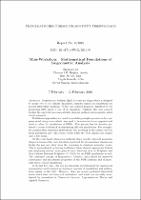| dc.date.accessioned | 2019-10-24T15:13:44Z | |
| dc.date.available | 2019-10-24T15:13:44Z | |
| dc.date.issued | 2016 | |
| dc.identifier.uri | http://publications.mfo.de/handle/mfo/3510 | |
| dc.description.abstract | Isogeometric Analysis (IgA) is a new paradigm which is designed to merge two so far disjoint disciplines, namely, numerical simulations for partial differential equations (PDEs) and applied geometry. Initiated by the pioneering 2005 paper of one of us organizers (Hughes), this new concept bridges the gap between classical finite element methods and computer aided design concepts.
Traditional approaches are based on modeling complex geometries by computer aided design tools which then need to be converted to a computational mesh to allow for simulations of PDEs. This process has for decades presented a severe bottleneck in performing efficient simulations. For example, for complex fluid dynamics applications, the modeling of the surface and the mesh generation may take several weeks while the PDE simulations require only a few hours.
On the other hand, simulation methods which exactly represent geometric shapes in terms of the basis functions employed for the numerical simulations bridge the gap and allow from the beginning to eliminate geometry errors. This is accomplished by leaving traditional finite element approaches behind and employing instead more general basis functions such as B-Splines and Non-Uniform Rational B-Splines (NURBS) for the PDE simulations as well. The combined concept of Isogeometric Analysis (IgA) allows for improved convergence and smoothness properties of the PDE solutions and dramatically faster overall simulations.
In the last few years, this new paradigm has revolutionized the engineering communities and triggered an enormous amount of simulations and publications mainly in this field. However, there are several profound theoretical issues which have not been well understood and which are currently investigated by researchers in Numerical Analysis, Approximation Theory and Applied Geometry. | |
| dc.title | Mini-Workshop: Mathematical Foundations of Isogeometric Analysis | |
| dc.rights.license | Dieses Dokument darf im Rahmen von § 53 UrhG zum eigenen Gebrauch kostenfrei heruntergeladen, gelesen, gespeichert und ausgedruckt, aber nicht im Internet bereitgestellt oder an Außenstehende weitergegeben werden. | de |
| dc.rights.license | This document may be downloaded, read, stored and printed for your own use within the limits of § 53 UrhG but it may not be distributed via the internet or passed on to external parties. | en |
| dc.identifier.doi | 10.14760/OWR-2016-8 | |
| local.series.id | OWR-2016-8 | |
| local.subject.msc | 41 | |
| local.subject.msc | 51 | |
| local.subject.msc | 65 | |
| local.sortindex | 950 | |
| local.date-range | 07 Feb - 13 Feb 2016 | |
| local.workshopcode | 1606c | |
| local.workshoptitle | Mini-Workshop: Mathematical Foundations of Isogeometric Analysis | |
| local.organizers | Tom Hughes, Austin; Bert Jüttler, Linz; Angela Kunoth, Köln; Bernd Simeon, Kaiserslautern | |
| local.report-name | Workshop Report 2016,8 | |
| local.opc-photo-id | 1606c | |
| local.publishers-doi | 10.4171/OWR/2016/8 | |
| local.ems-reference | Hughes Thomas, Jüttler Bert, Kunoth Angela, Simeon Bernd: Mini-Workshop: Mathematical Foundations of Isogeometric Analysis. Oberwolfach Rep. 13 (2016), 341-385. doi: 10.4171/OWR/2016/8 | |

